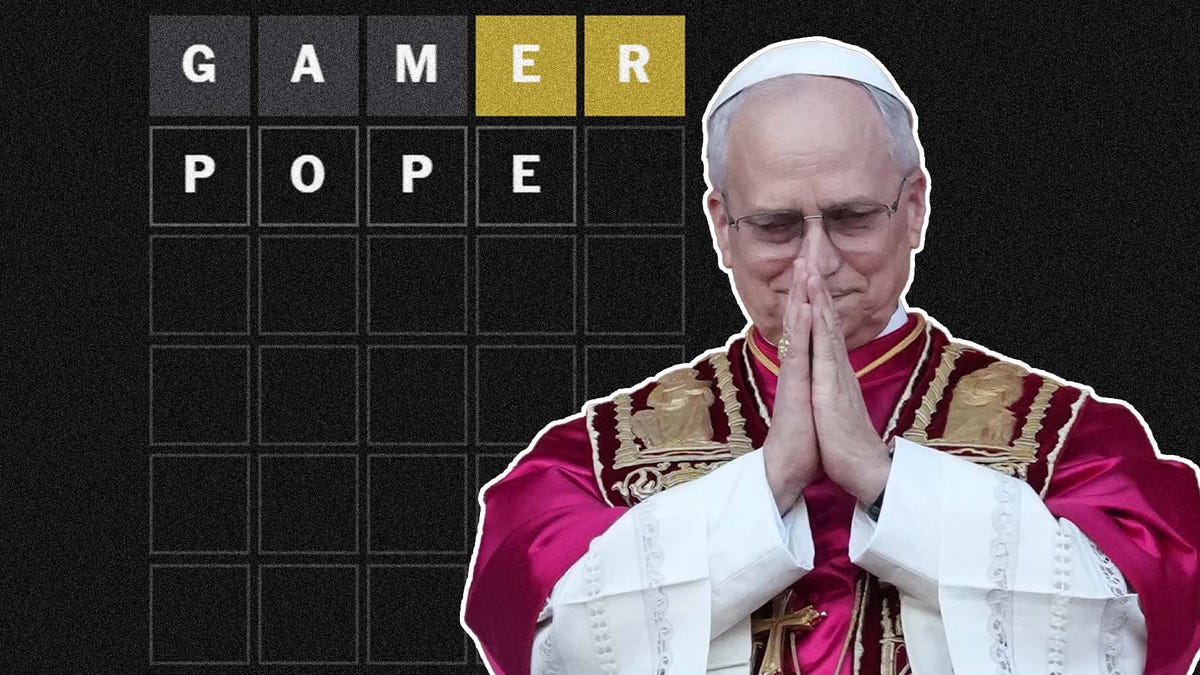## From Papal Encyclicals to Pixelated Pilgrims: The New Pope’s Secret Gaming Life
Hold onto your rosaries, folks, because the Vatican just got a whole lot more “level up.” A bombshell report from Kotaku has revealed a surprising side to the head of the Catholic Church: a passion for video games. Forget the sweeping pronouncements and solemn masses, the New Pope apparently has a hidden addiction to slaying digital dragons and navigating virtual worlds.

Examining the Intersection of Faith and Gaming Culture

The recent election of Pope Leo XIV, known in his pre-papal life as Robert Francis Prevost, has sent ripples through the gaming community. Prevost, the first American pope in history, is also believed to be the first pontiff with a penchant for video games. While details remain scarce, reports from his brother suggest a regular Wordle and Words With Friends routine, hinting at a level of engagement that transcends casual play.
This unexpected revelation raises intriguing questions about the intersection of faith and gaming culture, two seemingly disparate spheres that share a surprising amount of common ground. For centuries, gaming has been viewed as a predominantly secular pursuit, often associated with entertainment and escapism. Yet, the rise of digital games as a powerful medium for storytelling, exploration, and social interaction has blurred these lines, prompting a re-evaluation of gaming’s role in society, including its potential impact on religious beliefs and practices.

The Appeal of Escapism: Finding Solace in Virtual Worlds
One of the key reasons behind gaming’s widespread appeal is its ability to offer a temporary escape from the pressures and complexities of real life. The immersive nature of video games allows players to step into fantastical worlds, engage in thrilling adventures, and explore uncharted territories. This sense of escapism can be particularly appealing to individuals seeking solace from daily stresses, personal challenges, or even societal anxieties.
For some gamers, virtual worlds provide a refuge from a harsh reality. They offer a sense of control, agency, and accomplishment that may be lacking in their everyday lives. In these digital realms, players can overcome obstacles, achieve goals, and forge meaningful connections with others, fostering a sense of belonging and purpose.
While escapism can be a valuable coping mechanism, it’s essential to maintain a healthy balance between the virtual and real worlds. Excessive gaming can lead to social isolation, neglecting responsibilities, and even addiction. It’s important to recognize the potential pitfalls of escapism and to use gaming as a tool for relaxation and entertainment, rather than a means of avoiding real-life issues.

Religious Themes in Gaming: Exploring Morality and Meaning
Interestingly, the lines between faith and gaming are not always clear-cut. Many video games explore religious themes, moral dilemmas, and existential questions, prompting players to confront their own beliefs and values.
Games like The Last of Us, BioShock, and God of War delve into complex ethical issues, exploring themes of sacrifice, redemption, and the nature of good and evil. These narratives often challenge players to make difficult choices that have far-reaching consequences, forcing them to grapple with moral ambiguity and the complexities of human nature.
Furthermore, certain games incorporate religious iconography, mythology, or folklore into their worlds, creating immersive experiences that engage with spiritual and cultural traditions. For instance, games like Okami and Journey draw inspiration from Japanese Shintoism and Sufism respectively, weaving religious symbolism into their gameplay and narratives.
Implications for the Catholic Church and Gaming Communities
The unexpected revelation of Pope Leo XIV’s gaming habits has sparked a flurry of discussion within both the Catholic Church and the gaming community. This convergence of seemingly disparate worlds raises a number of important questions about the potential impacts of this unusual intersection.
Positive Impacts: Breaking Stigmas and Fostering Dialogue
The pope’s openness about his gaming interests could help break down the stigma surrounding video games within the Catholic Church. For years, gaming has been viewed with suspicion by some religious leaders, who associate it with violence, addiction, and a lack of spiritual depth. Pope Leo XIV’s embrace of gaming challenges this preconceived notion, suggesting that faith and gaming can coexist harmoniously.
Furthermore, the pope’s gaming habits could provide a valuable avenue for dialogue between the Church and gamers. By engaging with this popular culture phenomenon, the Church can demonstrate its willingness to understand and relate to the concerns and interests of younger generations. This openness to dialogue can help bridge the gap between traditional religious institutions and the ever-evolving world of digital entertainment.
Potential Challenges: Navigating Cultural Differences and Misinterpretations
Despite the potential benefits, Pope Leo XIV’s gaming interests also present some potential challenges. The gaming community is diverse and often characterized by its irreverence, humor, and embrace of subcultures that may not always align with traditional religious values. There is a risk that the pope’s gaming associations could be misconstrued or lead to unintended consequences.
Furthermore, the nature of video games, with their often violent or mature themes, could clash with certain religious doctrines. It’s important for the Church to carefully consider the potential impact of gaming on its teachings and to ensure that any engagement with the gaming world is done in a way that is both authentic and respectful.
The Future of Faith and Gaming: A New Era of Engagement?
The election of Pope Leo XIV marks a significant moment in the evolving relationship between faith and gaming. His willingness to embrace gaming as a part of his personal life signals a shift in perspective within the Catholic Church, suggesting a greater openness to engaging with digital culture and its potential impact on the lives of its followers.
This development could pave the way for a new era of dialogue and collaboration between religious institutions and the gaming community. It presents an opportunity to explore the common ground between faith and gaming, to address concerns and misconceptions, and to find ways to harness the power of gaming for positive social and spiritual purposes.
As technology continues to advance and gaming evolves into an even more integral part of our lives, the intersection of faith and gaming will undoubtedly become increasingly important. Pope Leo XIV’s gaming habits offer a glimpse into this evolving landscape, suggesting a future where religion and gaming can coexist and even complement each other, enriching the lives of individuals and communities alike.
Conclusion
So, the Pope is playing video games. It seems absurd, right? Yet, here we are, with footage of this global spiritual leader immersed in the worlds of “Tomb Raider” and “The Last of Us”. Kotaku’s article delves into this unlikely intersection, exploring the motivations behind the Pope’s gaming habits and the potential implications for both the Church and the gaming industry. We see a man seeking connection, exploring narratives, and engaging with a medium that transcends traditional boundaries.
The significance of this isn’t just about a powerful figure embracing a seemingly trivial pastime. It’s about the evolving nature of entertainment, the blurring lines between high culture and pop culture, and the increasing power of games to connect us on a deeper level. This could be a pivotal moment, a sign that the Church is finally acknowledging the cultural weight of gaming and its potential to inspire, entertain, and even enlighten. Will this lead to greater understanding and acceptance within the gaming community? Will it inspire other religious figures to explore this medium? Only time will tell. But one thing is certain: the Pope playing video games is a conversation starter, a challenge to our preconceived notions, and a reminder that the lines between worlds are often thinner than we think.
In the end, perhaps the most important question isn’t “Why is the Pope playing video games?”, but “What can we learn from him?” The answer, it seems, is that the future is less about separation and more about finding common ground, where faith and fun, tradition and technology, can coexist and even enrich each other. The game has changed, and we, like the Pope, are just beginning to play.